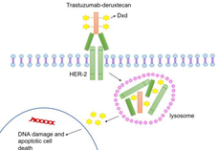The FDA has fast-tracked approval of a-first-of-its-kind immunotherapy treatment for breast cancer.This new treatment uses two different types of cancer therapy: Abraxane, a type of chemotherapy, and Tecentriq (generic name atezolizumab), a type of immunotherapy. Tecentriq has already been approved to treat certain kinds of urinary and lung cancers.The new treatment is specifically for triple negative breast cancer (TNBC), a notoriously aggressive form of the disease.TNBC Photo: Adobe Stock/andreaobzerova
Photo: Adobe Stock/andreaobzerova
In TNBC, the cancerous cells don’t have receptors for estrogen, progesterone, or the protein HER-2/neu, all of which fuel cancer growth. This means doctors can’t use hormone therapy in addition to other treatments to target the cancerous cells, leaving them with one less tool in their arsenal.Anywhere from 10% to 20% of women diagnosed with breast cancer have TNBC. Women who are Hispanic or African-American, have the BRCA1 gene mutation, and/or are diagnosed with breast under age 50 are more likely to have TNBC, and the survival rate for TNBC is lower than other breast cancers.This therapy regimen is used on TNBC that can’t be removed with surgery and is either locally advanced or metastatic. The tumors must also have a protein called PD-L1 in order for the treatment to work properly. About 20% of TNBC cancer have the protein.How it works Photo: Adobe Stock/peckyhyong
Photo: Adobe Stock/peckyhyong
The immune system on its own typically views cancerous cells as part of the body, so it doesn’t attack them. This therapy changes that.First, chemotherapy damages the cancer cells. Then, Tecentriq is administered, and this attaches to the cancer cells and disables the PD-L1 protein, which protects the cell from the immune system. Now that the immune system sees the cancer as an invader, it attacks.Chemo is given every week, while Tecentriq is given intravenously every other week.Accelerated Approval Photo: Adobe Stock/freshidea
Photo: Adobe Stock/freshidea
A study published in October of 2018 in The New England Journal Of Medicine prompted the accelerated approval of this treatment. The study found that the therapy regimen lengthened the amount of time that a patient could survive without their cancer worsening. For some women, their survival was extended by 10 months, and the risk of cancer becoming metastatic dropped by up to 40%.“This is the first time immunotherapy has worked in such a difficult-to-treat cancer, and is a huge step forward for these breast cancer patients,” said lead author of the study, Dr. Peter Schmid.An “accelerated approval” by the FDA is contingent upon future successful trials. For this treatment, a final report on the drug’s efficacy is due to the FDA by September of 2020. If the drug is considered beneficial, a traditional FDA approval will be given. If not, the drug could be pulled.Source






